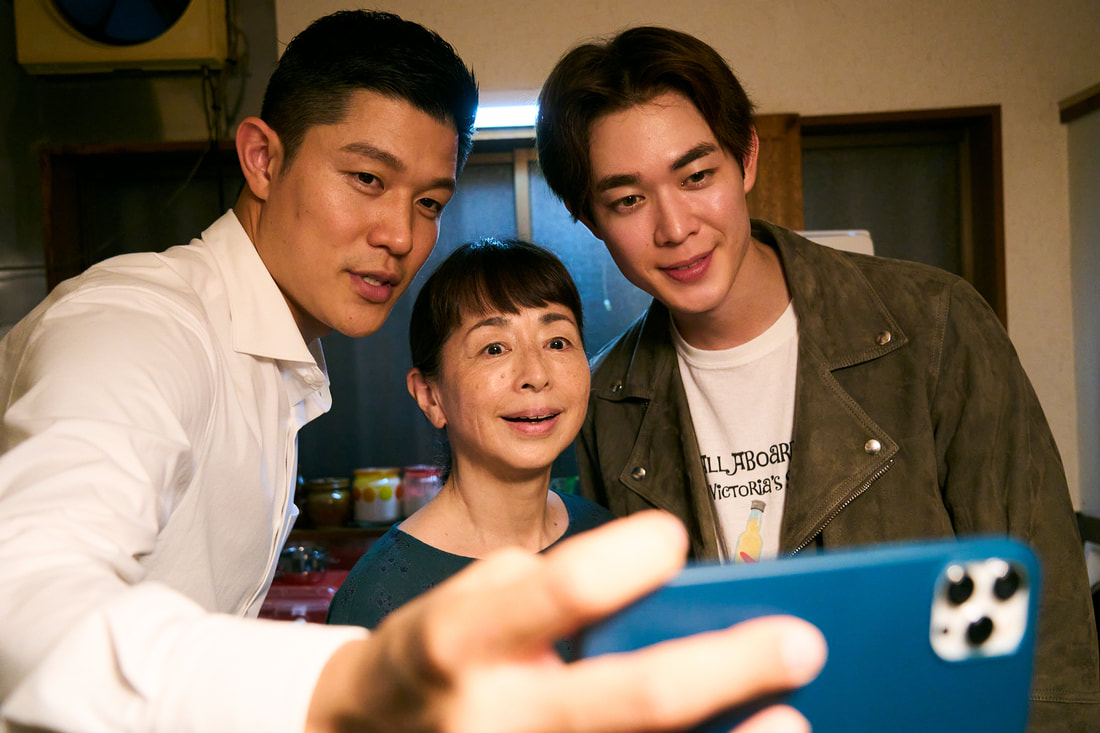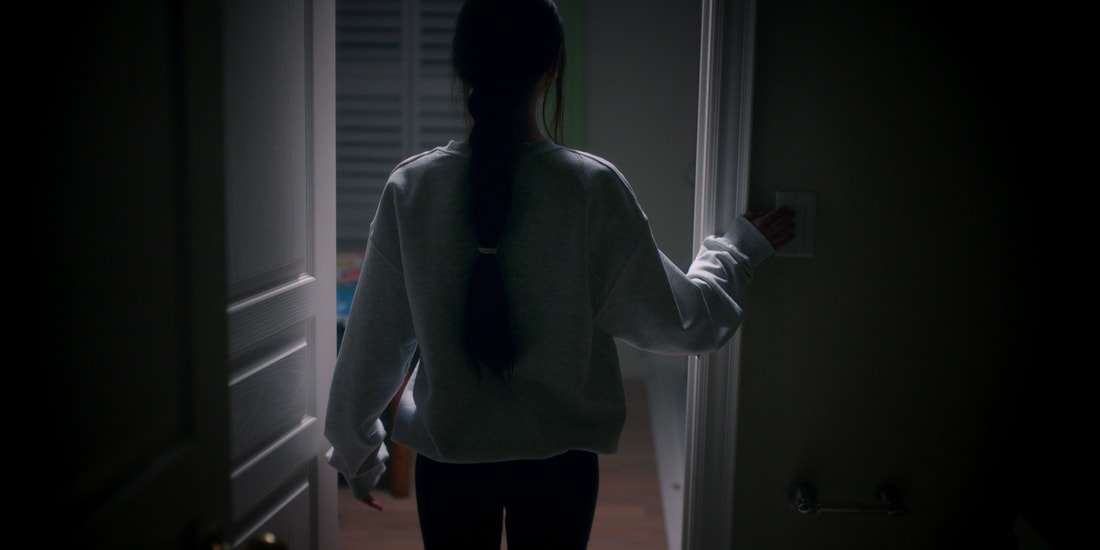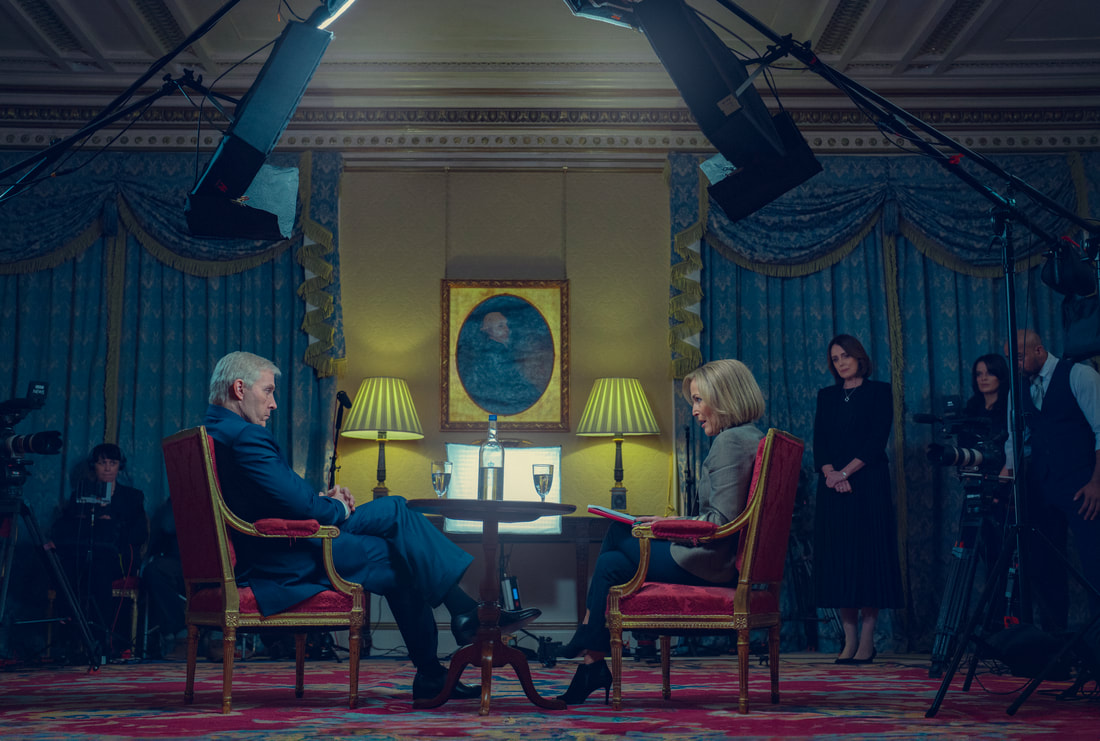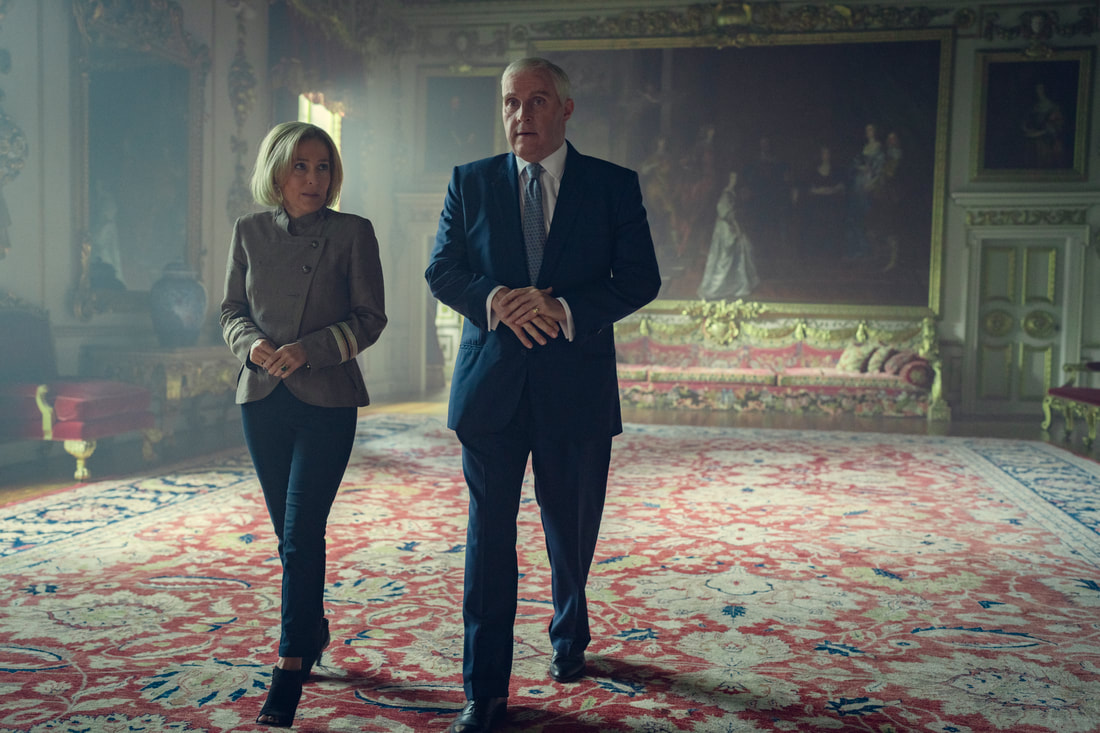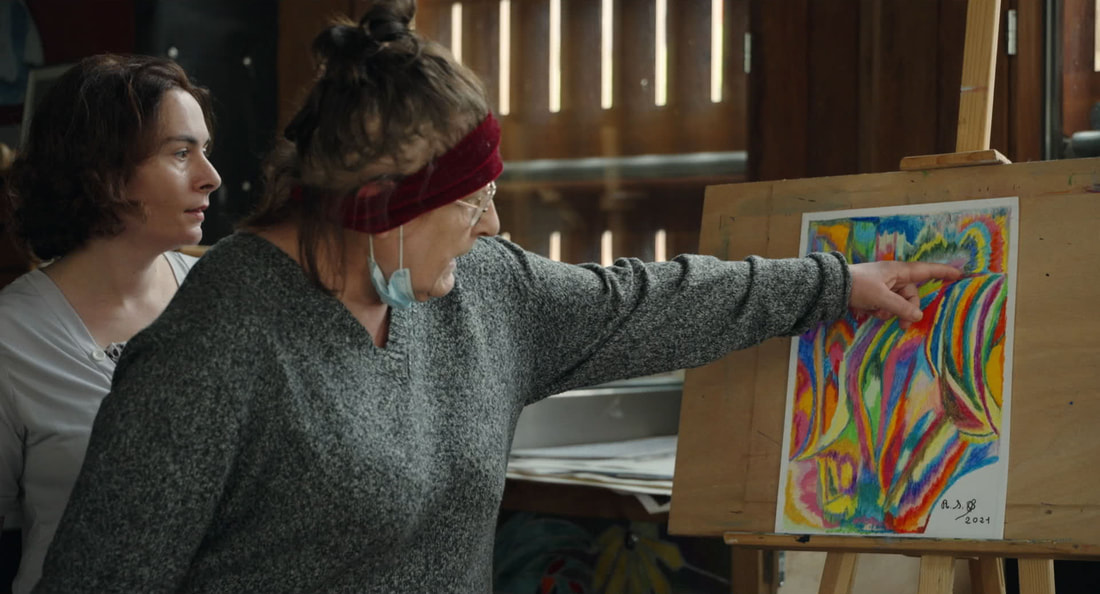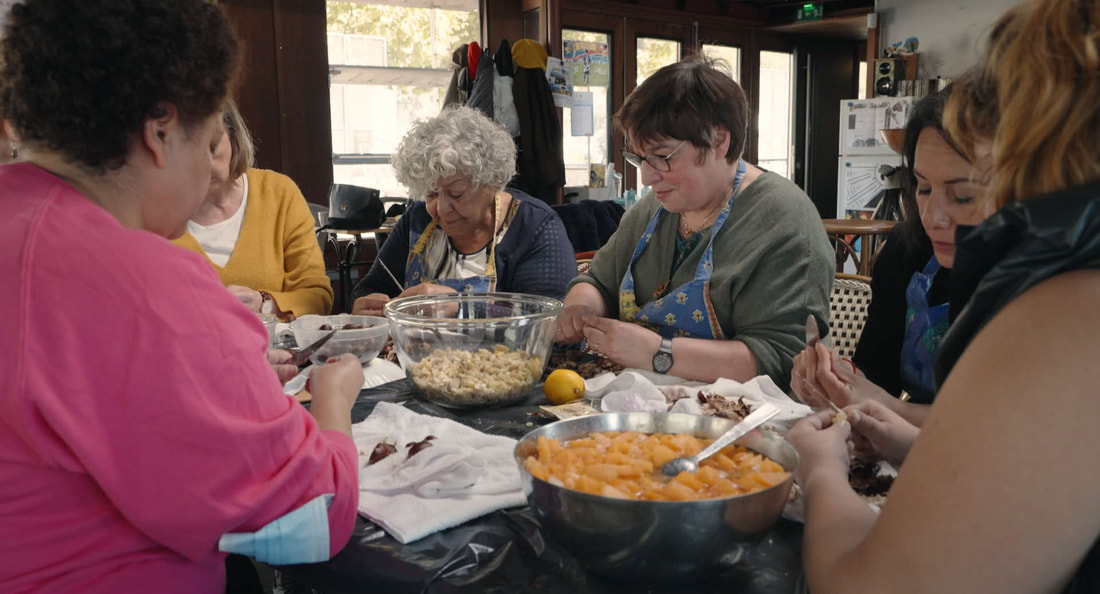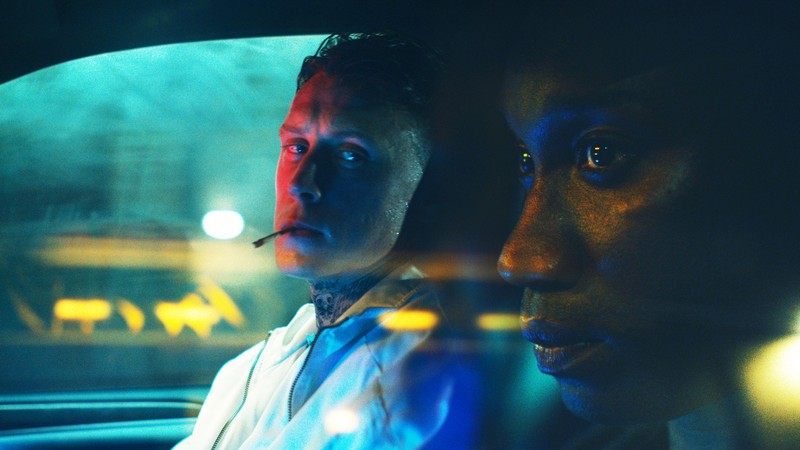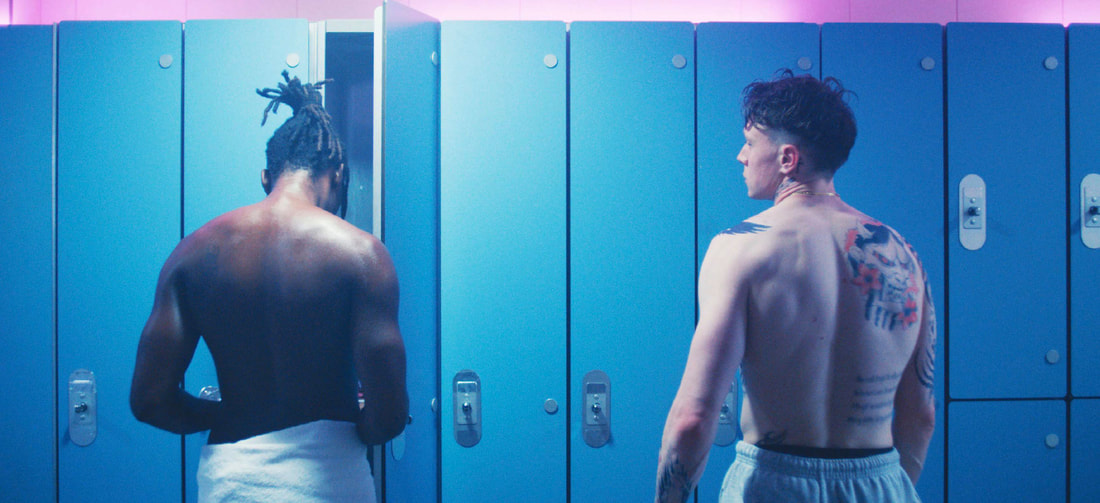|
Review by Joseph Fayed Don't you hate it when your work follows you home? A Sacrifice is a mystery thriller that follows an extreme example of that. This German-American production is action-packed, but its investigation into a new-age cult loses its footing in the latter half when it becomes nothing more than your typical search-and-rescue mission story. Ben Monroe (Eric Bana) is an American social psychologist on assignment in Germany. Ben investigates a series of unusual deaths that appear to be linked to a new-age cult. Aided by Nina (Sylvia Hoeks), he tries to get closer to the root cause. In the meantime, his teenage daughter Mazzy (Sadie Sink) arrives to spend time with her dad. Mazzy's parents have separated, and while father and daughter haven't been able to deal with that yet, that soon becomes the least of their worries. Martin (Jonas Dassler) befriends Mazzie, and as the two hit it off, it appears Martin may be one of the missing links to Ben's case. Ben's investigation and Martin's own agenda create life-or-death consequences for everyone involved. Lines such as "We are what we create" echo throughout the film and the psychology behind it. It is clear how this was the intended premise behind the film, which in turn was adapted from the novel Tokyo by Nicholas Hogg. Changing the setting and characters' names doesn't make it stand out from any other "foreigner in Europe" stories. Changing those details also doesn't show how this enigmatic cult came to be. The lack of depth and understanding of this cult, which acts as the primary antagonist here, is jarring because how vague the film is trying to be isn't executed very well due to the lack of suspense or mystery that leads to the conclusion. If an academic perspective on cults is too boring for you, then you may appreciate the second act pivot towards kidnapping, murder, and suicide. One positive note is that the film never becomes dull, even if the story behind it is poorly told. There is never too long of a gap where something messed up doesn't happen to one of our four leads. Most of the plot points can be seen coming from a mile away, which makes their reveal unintentionally hilarious. For example, Nina receives a phone call with crucial information she must keep secret. Before that scene, her personality was extremely dry in all of her scenes, so it was funny to see a turnaround to make her more relevant somehow.
Eric Bana has entered the mid-50s Liam Neeson dad era of his career. Australia must be so proud. His performance here is simply okay, but you definitely can tell which parts of the script he was comfortable acting. It's not the B-movie action flick jargon, but to his credit, he also doesn't overact his way through those scenes. Sadie Sink plays a bitchy teenager, and Sylvia Hoeks saves her energy until it is needed. Both were unremarkable but passable in their roles. Jonas Dassler is the one who got to display the most range because of how his character is written. He has a certain sad boy aura that European cinema tends to admire, so I expect him to appear in some Mubi original in the future if the right director/writer is willing to give him a chance. A Sacrifice is pretty mindless. Everything will be laid out in front of you, except for the whole cult aspect. But when you see glimpses of how bizarre a cult like that truly is, then at least you will be slightly more sympathetic towards our protagonists. Getting in and out of a cult is not as cut and dry as the film will make you believe, but I'm certain this fictional take on one will inspire the next wave of middle-aged dads to rescue their daughters in Western European countries. A Sacrifice hits theaters on June 28. Rating: 2/5
0 Comments
Review by Joseph Fayed If you have ever heard the phrase "drinking the Kool-aid," you probably already know the fate of the People's Temple, led by Jim Jones. Over 900 died from poisoning in Jonestown, Guyana, making it the largest intentional loss of American citizens until 9/11. Cult Massacre: One Day in Jonestown is a three-part National Geographic docuseries that interviews survivors, both members of the cult and some concerned members of Congress and the media who were there that fateful day in 1978. Heart-pounding stories of survival are shared in the docuseries, which begins to lose a bit of its edge by the end of its run. On November 14th, 1978, Congressman Leo Ryan, along with a team of his staff members and reporters, flew to Guyana to visit Jonestown, the sect of the People's Temple founded by Jim Jones that had relocated from the United States several years prior. This visit came after a growing number of relatives of members of the People's Temple wrote to the Congressman, expressing how they had not been able to contact any of their loved ones in many months. A few days later, the group is allowed to visit Jonestown. Shortly after their arrival, several members tell Ryan they secretly want to leave. When this information gets leaked to Jones, it sets off a domino effect for something sinister he had planned should members try to deflect. Survivors who were both members and non-members recount how they were able to escape the nightmare that quickly unfolded. The docuseries is divided in the most reasonable way possible for content with just three episodes. By focusing on the beginning of the end, the day of, and the day after, it is phased out with an equal amount of coverage for how Jonestown fell apart. I'm sure there are years of stories leading up to the tragedy that deserve to be told and say more about who Jim Jones really was than these few survivors recall. But with that said, the documentary lays enough groundwork in the first episode to give you a definitive answer as to who Jones really was. The docuseries avoids being a flat-out character study of Jones but allows those interviewed to share their experiences with him and how their perceptions differed by the fateful day in 1978. This docuseries is survivor-centric, with both members and non-members who were in Guyana making up nearly all of the talking heads. There are no cult experts or outsider perspectives shared here, which is for the best because hearing the red flags from survivors feels more damning than from someone who has only studied cults like this one. The interviews with the various survivors are edited together pretty well, recapping the natural flow of what occurred in those last few days. With some of them, you feel like a lot was left on the cutting room floor due to time constraints. One particular survivor, Leslie, is not featured until episode three, and she shares a largely overlooked story of her and about 15 other survivors fleeing Jonestown the morning of the massacre. It would have been interesting to hear more from her versus the retelling of the other escape involving the Congressman.
This being made by National Geographic, there are no obvious signs of poor directing, such as horribly acted reenactments or large amounts of B-roll. Archive footage of those who are deceased and that of The People's Temple live on, and thankfully for the viewer, plenty of it was preserved to paint a picture of what Jonestown appeared to be like from the outside as this Utopia. At the same time, the words of the survivors reveal it was anything but. The interviews are set up for the subject to speak directly to the camera, often in a close-up. It comes across as an interrogation at times. Still, when intercut with footage from 1978, the cinematography and camera angle remind you that this is a survivor speaking to us in the present. Cult Massacre: One Day in Jonestown depicts how mass murder came to be. This docuseries has an important distinction from previous ones I've seen where a title card at the end points out how this tragedy was long regarded as a mass suicide but is now seen as murder. This is largely because of how testimonies from that day have changed the narrative. Hearing some of those survivors recount their survival is chilling, but narratively speaking, the filmmakers tie it together for the most part. While some moments arguably deserve to be highlighted more, what and how it all went wrong is exactly what we still talk about and look out for in modern-day cults. Like similar series about cults in the present, there could easily be room for another episode about the aftermath of survival. Cult Massacre: One Day in Jonestown is now streaming on Hulu. All three episodes reviewed. Rating: 4/5 Review by Joseph Fayed Having your directorial debut produced by A24 is no easy accomplishment. With only a few shorts under her belt, Daina O. Pusić had a lot to aspire to. With Tuesday, Pusic takes dark themes intertwined with humor and, under her direction, turns her own family drama into something witty and moving enough — even with its mixed messages about life and death. Tuesday (Lola Petticrew) is a terminally ill teenager who spends her days at home; most of the time, she is alone. Her mother, Zora (Julia Louis-Dreyfus), has grown distant from her daughter and can't accept her diagnosis while going through a bit of personal crisis. One day, Tuesday is visited by death (voiced by Arinze Kene) in the form of a talking parrot. She bonds with death and confesses that she is tired of living. Before death can grant his wish, Zora confronts death, and that includes having a heart-to-heart with her daughter, but not before a series of misadventures begin for the two of them. Most of the action, especially once death arrives and is discovered by Zora, comes after a lengthy period of time where little takes place in the script. The pacing in the first half is slow and then speeds through its second act to reach its conclusion. How it approaches Death, literally and figuratively, makes the film stand out. What it gets right is the fair balance between humor and sadness, but it's mainly the former that will hook you in at certain moments rather than lose you. Tuesday is as close to a real depiction of a teenage girl with a terminal illness as you will find in a fantasy drama without making her feel too sappy. She has found the closure she wants to end her life with, but her personality doesn't feel one-sided. In fact, she is the only character who feels multi-dimensional. We get to see two different sides of her around Death and her mom. She is open with them both to an extent, and that is utterly realistic for someone in her age demographic.
Lola Petticrew gives the most compelling turn of this cast and carries most of the heavy weight of this film on her back. Julia Louis-Dreyfus, who gives a rare dramatic performance here, will most likely be regarded as being the most sincere in her role. Although her comedic chops benefit her in certain scenes, Louis-Dreyfus in grief is just as strong on-screen, especially given how out of style a character like this is for her. Arinze Kene, in a role as confusing as Death in parrot form normally sounds, makes the most of his deep-sounding voice to emulate darkness. His line reads and delivery are sharp, but ultimately, he is best utilized as a talking metaphor for something greater, such as dying, versus being used for funny gags which get tiresome later on. Tuesday is a beautifully shot film that is both a technical and cinematographic masterpiece. Its contrasting colors and CGI are very well done, and almost every shot/aspect ratio highlights both what we are supposed to be focusing on and the background catching your attention. That said, the pacing is all over the place and can't circle back to its primary focus in time to save it. It is meant to be both witty and sad, but balancing the two proves to be easier acted by Petticrew and Louis-Dreyfus than it is written and directed by Pusic. If this becomes a sleeper hit, then maybe A24 can greenlight its next prequel and call it Death about everyone's favorite macaw turned slayer of humans and his humble origins. Gotta get more arthouse-funded franchises made somehow! Tuesday is now in theaters. Rating: 2.5/5 Review by Joseph Fayed Director Nicholas Tomnay does not have the most extensive filmography, but his latest feature, What You Wish For, I consider to be the second installment of his "shady rich people host dinner parties" universe. This thriller is like a mash-up of previous films with similar twists and turns. This one does it just right by having just the right amount of suspense to not lean into being utterly ridiculous. Ryan (Nick Stahl) is a chef running away from his past. With a rising number of gambling debts and people out to find him, he finds refuge at a remote villa in Colombia occupied by his old friend Jack. As the two catch up, Jack reveals he is now employed by a prestigious catering company as a private chef. In preparation for his next dinner, Jack goes missing. Ryan, unable to face the consequences of what he has fled from and desperate for money, decides to assume Jack's identity and work this high-profile dinner. But when his new employers arrive at the villa, oblivious to who he really is, things take a dark turn for Ryan, and there are depraved consequences for what he has done. Rich people doing evil things with their money just because they can has practically become its own genre these days. Popular approaches in the past have included a level of sarcasm (Triangle of Sadness) or having the main characters experience a moral dilemma that puts their own behavior into perspective (The Menu). This film stands out because there is little compassion to be shown across the table. No one is redeemable, as everyone tries to avoid being caught in the act. The pacing of the film manages to leave you engaged and never bored. The first act sets up the rest very well by being intentionally vague about what Jack has been up to. The viewer slowly realizes what Ryan has unknowingly signed up for and must go through the motions and neglect his former self in the process of doing so. When the big reveal of what his employers are really there for happens, it is written as part of a casual interaction, and the course of action includes no questions from Ryan. Any moments of panicking, as most people with humanity and less of an income typically would, are few and far between. It helps keep the film more suspenseful because Ryan doesn't feel like he's pulled back to reality yet, as this is supposed to be his new norm.
Nick Stahl plays Ryan realistically without trying too hard to be realistic. He and the rest of the cast deserve credit for their roles. Imogene and Maurice, along with all of the dinner party guests, are very unsettling and do so without going over the top. Nicholas Tomnay's direction is almost sullen at times, but the tone is consistent throughout. Some of the line reads feel so natural to the actors playing truly despicable people that you think they could really do this for a living. What You Wish For is a welcomed addition to the "rich people do awful things" genre of film. This B-movie gets off the ground fast and is quite enthralling. It perfectly captures a concept that seems out of the ordinary but doesn't rely on heavily lampooning the ultra-wealthy. Instead, their actions solely cause any judgment, and there are no innocent bystanders around except for you, the viewer. Terrible people and their enablers make the world a terrible place, but they also make this a not-so-terrible film to watch — very much a catch-22 scenario. What You Wish For hits theaters and VOD on May 31. Rating: 5/5 Review by Joseph Fayed Solo is a queer romantic drama that proves how messy gay people can be. Director Sophie Dupuis puts the pieces to this puzzle that many queer or queer-friendly filmmakers haven't yet understood. With its mix of estranged family and a torrid love affair that inflicts harm upon an up-and-coming drag queen who vows to overcome all of it, no one is left unscathed. Simon (Théodore Pellerin) is a young drag queen performing at a Montreal club. There, he warms himself up to the club's newest performer, Olivier (Felix Maritaud). Simon is head over heels for Olivier, who is willing to give him his time initially. Just as quickly as they begin rehearsing a new act together, they begin a relationship. Amidst all this, Simon finds out his mother, a famous Opera singer he hasn't seen in 15 years, has returned to Montreal for a limited time. Reconnecting with his mother becomes Simon's priority, but what about Olivier? They soon begin to wonder if they have what it takes to maintain what they have in the long term. Dupuis's script focuses on the right aspects to make the protagonist, Simon, more interesting while not alienating him too much from his counterpart, Olivier. Their character traits are similar, making them compatible and embraced by Simon's family. Make no mistake, this isn't a film about finding queer acceptance from those you love the most. Simon's family is supportive of him and his relationship, but his troubles with Olivier don't affect them directly. By the time Simon's mother is introduced, any friction Simon may have towards his mom feels secondary to the plot because he has already proven to be unphased by her, and he has become so enamored with Olivier. While we do see tension between Simon and his sister later on, his family has relatively little influence on Simon and how he sees his mother and Olivier. Despite his general closeness to his family, it is good to see how Simon was written to be independent of them and have them have little interference in his decisions. The outcome of his relationship with Olivier is because of how their own perspectives have changed. Olivier, who gradually lets his nature be known, is seductive and charming and owes nobody anything. There is no mask-off moment revealing another side of him towards the end; Dupuis lets the viewer sink into the open book, which is this character she wrote.
Théodore Pellin and Felix Maritaud are both full of pizzazz on screen. When they lock eyes during more intimate scenes, you are in awe. When they are rehearsing and laughing, you are laughing with them. When either of them is on stage performing, you are feeling vitality. They act alongside each other very well, and because the characters feel very similar, both performances are up to par with each other. In drag, Théodore Pellin is styled almost like Kathie Lee Gifford, which you can't unnotice once you see it, but I consider that makes Pellin's role more camp than it was intended to be by an actor who doesn't typically perform in drag. Solo has all eyes on its captivating leading duo. Romance and family are intertwined by a burning passion for more, and under the direction and writing of Dupuis, both have enough space to not intrude on what the other is trying to say. This is a queer drama that does not feel influenced by heteronormative standards or messaging at all, and as we approach Pride month, I think it's a good start. Solo is now in theaters. Rating: 5/5 Review by Joseph Fayed Egoist doesn't ask its audience how one should process grief, but instead how you live with it when it is all you have known. This heartbreaking Japanese queer drama puts emphasis on personal tragedies. But with its depressing themes comes a great challenge, a script that deserves to be more mellowed out, and with certain rushed plot points, it feels the opposite was happening. Mr. Kosuke (Ryohei Suzuki) is now an openly gay fashion magazine editor in Tokyo. Growing up, he lived in fear of his true identity and lost his mother, too. He meets Ryuta (Hio Miyazawa), his new personal trainer, and the two grow very close. He soon meets Ryuta's mom and feels a connection to her, just like he had with his mother. Then, one day, Mr. Kosuke receives news no one expected that puts deeper meaning on the relationships he has. One of the best things the film offers is the romance between its two leads. The strong chemistry between Suzuki and Miyazawa is present throughout. Opposites, especially in social classes, rarely attract, contrary to what popular culture has taught you. However, there is sincerity presented between the two main characters that causes sparks to fly and doesn't feel cheesy. Mr. Kosuke's sheer generosity towards Ryuta is not met with any third-party opposition. I could see how one would find this boring, but those scenes of them being cute together carry you through most of their relationship and the best parts of the film. What the film doesn't properly address is its mommy issues. Everything centered around Ryuta's mother unleashes chaos — and not the fun, campy kind. Her introduction serves as the moment when the pacing of this queer romance becomes too rushed for enjoyment. Her character as a whole feels shooed in almost. The little buildup in anticipation of her on-screen arrival contributes to this feeling. Her introduction, set over a homemade dinner, needed to happen before the end of the first act as her son's key characteristic, that he had a mom he was very close to, remained an afterthought for far too long.
Death is another topic this film has absolutely no idea to approach. It's implied Mr. Kosuke has been through hell and back in his life, so when another death occurs in the climax, we begin to see him crack. This film takes the title from most horror films for a most unexpected death. But it's unintentionally hilarious how melodramatic Ryohei Suzuki's acting becomes from this point forward. His reaction to this untimely loss doesn't feel like the cathartic release he's been waiting for. It comes across as constipation with two tears — one from each eye — for dramatic effect. Still struggling to keep up with the pace in the latter half, the grim reaper decides to make a more drawn-out departure for another character. At least this one could be blamed on illness, but Mr. Kosuke and his kiss of death illicit heartbreak one last time. Egoist is a film that is held back by grief and family. Its romance had strong promises but intertwined with plot devices that are too rushed, everything falls apart. This being a queer romance doesn't mean it's entitled to have a happy ending, but its major shift wasn't even becoming too bleak. It was just too weepy to function — a true ego death. Egoist is now in theaters. Rating: 2.5/5 Review by Joseph Fayed If you follow true crime, and specifically familicide, you have likely heard of Jennifer Pan. The Netflix documentary What Jennifer Did gives a summary of the brutal crime that took place and the investigation into it. Under the helm of director Jenny Popplewell, not even the horrific details alone can save this documentary from lacking any insight beyond the surface level to explain why someone like Jennifer would be driven to kill. In November 2010, Bich Ha Pan was murdered and her husband Huei Hann Pan was severely injured inside their home in Markham, Ontario, Canada. Their 24 year old daughter Jennifer was upstairs, tied up but unharmed and managed to make a frantic 911 call. As the only survivor who is able to recount what happened, Jennifer shares how three men broke in and attacked her family. But soon investigators begin to question Jennifer and her story falls through. Jennifer and three co-conspirators were later convicted of first-degree murder. This documentary follows the course of the investigation that began in the immediate aftermath of the murder. Instead of presenting Jennifer and her parents' lives and building up to the murder, this peels back certain key moments that, in hindsight, may have lead to the murder. This formatting is largely due to the heavy reliance on footage of Jennifer from police interrogation rooms. Law & Order, this is not. Not that there typically is a problem with telling a true story in chronological order, but so much of it consists of the detectives simply rehashing what Jennifer said. There's no fresh perspective given here from any of the main talking heads, which defeats the purpose of revisiting what was once a highly publicized case in the first place. One angle to the story to was massively overlooked was the allegation that the Pan's were "Tiger Parents" — a stereotype of strict parenting often associated with Asian households. Hinted at by a former friend of Jennifer's, who receives a real lack of screen time in comparison to the detectives, this was the most we learned about Jennifer's struggles with her parents. In the case being built against Jennifer, a lot of the information we learned was sidelined in favor of Jennifer's eventual confession. Three other people were convicted of the same crime, but the documentary did not treat their involvement as the same. Overall, a lot that happened outside of Jennifer's three separate interrogations by police was ignored to talk about said interrogations as if it doesn't already exist online.
B-roll footage in documentaries annoys me to no end, but this one goes overboard with it. Whether it's driving their squad car in slow motion or solemnly staring off into space, it's such a bizarre direction, and I don't understand why some directors insist on doing that. Netflix has been riding the true crime wave for a decade, but lately they've been lacking the bite they were once known for having. What Jennifer Did belongs in the hands of an actual journalist. Or at least someone who can convince witnesses, close friends/family, and legal experts on both sides to come forward and ask them questions they have yet to address. A title card at the very end reveals the four convicted will be granted a new trial in the murder of Bich Ha Pan. Of course, this documentary completely ignores that potentially life altering update, and it's a head scratching ending to say the least. As this story is ongoing, I hope whoever examines this case next gives it a more comprehensive effort. Dateline and Keith Morrison, don't let us down. What Jennifer Did streams on Netflix beginning April 10. Rating: 1/5 Review by Joseph Fayed One of the biggest news stories of 2019 was the arrest of Jeffrey Epstein for sex trafficking minors. Once his downfall became public, scrutiny grew onto his ultra-wealthy and/or famous associates who had spent a great deal of time with Epstein. One such friend was Prince Andrew. Scoop follows a team of producers who tried to get ahead of the developing story and land an exclusive interview with the Duke of York, who is unsure of how to rehabilitate his image. This biopic has many gotcha moments but gets too stuck in its format to make this dramatic retelling any more captivating. The film follows the crew of the BBC news program Newsnight, who, amidst the ongoing scandal with Jeffrey Epstein, decide to shift their focus onto Prince Andrew's ties to Epstein. Previously, their affiliation with each other had been nothing more than tabloid filler. However, upon accuser Virginia Roberts coming forward to share her story, news producer Sam McAlister (Billie Piper) and anchor Emily Maitlis (Gillian Anderson) race to be the first to get the Prince's thoughts on the allegations. In the meantime, those working for the Prince question if speaking out is really the right move for him. The characterization of Sam McAlister feels a tad bit like she is trying to Girlboss up the ranks of British television. She makes it her top priority to secure this interview, and we see her in action pursuing that, but it is very tame. Sam isn't written to be so ruthless that it's comical, like this archetype typically is. Instead, she's too reserved to have much focus on her. In what's arguably the greatest highlight of her career, she is reduced to essentially saying, "This is your reputation now, Andrew; let us know if you want to chat by Monday." It's not the mic drop moment it was intended to be, and once the interview actually takes place towards the end of the film, Sam is not much else besides background noise despite her crucial role in making it all possible. Gillian Anderson's ability to not make herself appear complacent regarding her big Prince Andrew interview is a warm welcome. For a film about a team of people working in the media, the journalist asking the tough questions is the only one less interested in the sensational elements of the story. There is a particular line of dialogue about another associate of Epstein that Emily says that I would have liked to see be explored further. Emily's reputation as a soft but hard interviewer is touched upon when she speaks to Prince Andrew and his staff beforehand. Still, in a story about abuse, it should be explained why she was perceived that way by someone who has such a high profile.
The sheer details about the accusations against Epstein don't receive too much focus here, which I could understand because it is not a story about his victims ultimately. While these allegations were not breaking news at the time of the Newsnight interview, a closer examination of how the Royal Palace would have reacted would have helped expand the story. You can't convince me that the only person around Prince Andrew regularly who is worried for him is his secretary. Not showing more of the palace in full-on crisis mode leading up to the interview was an inaccurate look at how an institution handles itself. Even seeing direct communications from Queen Elizabeth — an unseen character in this — would have better reflected the reality of the PR nightmare Prince Andrew landed himself in than what we were shown. In Scoop, we hear from the man at the center of a sensationalized story whose behavior during an interview became worldwide news. The reenactment of that interview is done very well, but those storylines behind the scenes of Newsnight and the Royal Palace go nowhere. What we are left with is that this highly anticipated expose came together like a fluff piece in a matter of days. The BBC and the Royal Palace get too much of a pass here, and it's disappointing because this was a groundbreaking moment for investigative journalism and the monarchy that was heavily underutilized. Scoop streams on Netflix beginning April 5. Rating: 2.5/5 Review by Joseph Fayed There's nothing traditional about On the Adamant simply because nothing like it has been profiled before. In this documentary, director Nicolas Philibert is granted access to a special day program, L'Adamant Day Center, for adults living with mental illness. The program's location stands out because it isn't inside any building you pass by on the street; it's a boat docked on the Seine River in Paris. The scenery around it isn't the only vibrant thing, as we see a colorful group of characters interacting with each other. It also proves how the heart and soul must be considered when discussing the mind and how to nurture it. The documentary is not very interview-heavy, which works in its favor. It refrains from focusing too heavily on the program's support staff except for moments where they require interaction with the patients, such as when going over their daily agenda. The archetypes the ensemble fits into are established early on. Examples include the artist who never quite made it, the older woman seeking affection, the single mother who lost custody of her son, etc. You can tell that during one-on-one interviews with each patient, they feel comfortable talking about themselves. Those conversations don't always feel like straightforward answers to straightforward questions. They give insight into their lives by first discussing a day in the life onboard the Adamant and then implying what brought them here and what they hope to gain. Telling the documentary in real time with its subjects humanizes those with mental illness better. The lack of focus on experts in mental health, for one, means nothing is eating away from the time we could be focusing on the actual participants in the program. Second, focusing on their diagnosis tends to lean towards addressing the negative aspects of mental illness rather than the positive. It would have been a major distraction from the uplifting moments of the group activities, so tonally, I'm glad this barely touched the surface level of mental illness because the alternative would've been exploitative. The overarching theme of this is creativity and personal freedoms being granted by an institutional force and what that entails. Most of what we see is how people can flourish under conditions that allow both structure and flexibility. One of the most fascinating parts of the documentary is of an older man who talks deeply about his love for cinema and his own close brushes with fame. His segment and the others feel intimate — even if they have vague answers to what was being asked of them. All they wanted was someone to listen to them, and the filmmakers respected that.
Passion for art doesn't need to feature one breaking the fourth wall or dropping shocking revelations. On the Adamant is meant to be an introduction into the lives of a small group of people with mental illness; it has the exact opposite approach as a documentary bringing awareness to the subject would typically have. All you need to be aware of is that people and a program like this exist, and then perhaps you should be motivated to research how these can be funded wherever you live. Vive la France and their humanistic approach towards treating mental health. On the Adamant is now in theaters. Rating: 4/5 Review by Joseph Fayed Revenge thriller Femme from directors Sam H. Freeman and Ng Choon Ping expands the idea behind their 2021 short into a feature. Addressing themes of sexuality, identity, and openness about the former, the film establishes conflicting narratives quite effectively. Two strong leading performances bring the heat to a script that prioritizes style and substance. Jules (Nathan Stewart-Jarrett) is a drag queen performing at a London nightclub. One night, outside the venue, he encounters Preston (George MacKay). The two exchange some words, which leads to Preston and his friends violently beating Jules. Months later, Jules, out of drag, encounters Preston, but he does not recognize him. The closeted Preston tries pursuing a relationship, but Jules is secretly in pursuit of something else: revenge. Jules' actions make them an anti-hero. The film's script does a good job of laying out the internal struggles both leads face in their lives. The film also lacks the use of internal monologue, a la Taxi Driver, and that decision alone gives the character of Jules more subtlety in their actions. We gradually learn more about Preston, and although he is more of an open book than Jules, his characterization makes the ending all the more worthwhile. The cinematography is exceptional. Certain moments leading up to something climatic are presented in hot pink or red, while scenes where the characters are supposed to feel isolated or alone are presented in blue. A color contrast like this is very creative and adds an extra layer of beauty to a story that is both figuratively and literally dark — in both subject matter and taking place mainly in the evening.
Nathan Stewart-Jarrett and George Mackay both drive it home with their performances. Stewart-Jarrett walks the fine line between authenticity and a persona he is putting on, and I don't mean his drag act. MacKay portrays his character as both short-tempered and with convincing cognitive dissonance. Directors Freeman and Ng pose the question of whether identity could ever be tainted if it is stripped away from us. They give their perspective answer on that and do not make the film feel like it has been dragged out beyond the opening act. The chemistry between Nathan and George is strong and their scenes together feel genuine whether they are acting as friend or foe. Femme builds its suspense in all the right places. It is both stylish and sexy and has the bark and bite to show you how complex revenge can be. The fluidity of these characters and how they become intertwined is so well done, and I hope that now that all eyes are on them, this is just the first of many more collaborations between the filmmakers. Femme is now playing in theaters. Rating: 5/5 |
Archives
July 2024
Authors
All
|
|
|
disappointment media
Dedicated to unique and diverse perspectives on cinema! |












